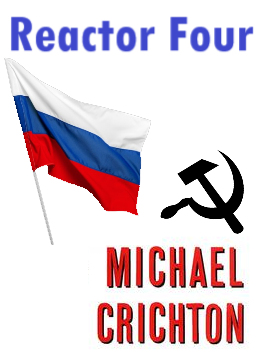Reactor Four
 | |
| Author | Michael Crichton |
|---|---|
| Country | United Commonwealth |
| Language | English |
| Genre | alternate history, speculative fiction, adventure novel |
| Published | November 2000 |
| ISBN | 0-00-715379-1 |
| 813.77 | |
Reactor Four (2000), by Michael Crichton, is an alternative history novel where the Three Mile Island disaster never happens and the Chernobyl disaster is much worse, causing a full on collapse of the Soviet Union in a similar vein to the United States, albeit much more violent.
The Story takes place in 2000, 14 years after a catastrophic Chernobyl disaster that contaminated much of Ukraine and Belarus. The story itself depicts a Russian family living through a second Russian civil war as NATO and China interfere in the conflict.
Development
After the discovery of the Congo Genetics Company and its operations in the backdrop of the Congo Wars, noting odd similarities to Crichton's 1990 novel Jurassic Park, Michael Crichton was encouraged to stray away from his science fiction norm and to "see what else he could predict"[1].
Plot Summary
Fictional chronology
After the Chernobyl disaster kills or uplifts thousands from Ukraine and Belarus, the Government of Ukraine declares its independence from the Soviet Union, followed by Belarus the next day. The Red Army moves to overthrow Gorbachev's government, proclaiming the KGB's Vladimir Kryuchkov as interim president, resulting in the proclamation of a 'legitimate' soviet government in Rostov. The following day the Baltic states proclaim their immediate secession. Kryuchkov's Provisional Government in Moscow sets a 30 day deadline for all rebel factions, which only emboldens the factions to prepare for an onslaught. Two weeks after the deadline hits, with an unofficial go ahead from Washington, revolutionaries in Poland managed to seize Warsaw, with the Communist government effectively collapsing. Within the following weeks, similar events occur throughout the Warsaw Pact, though not every revolt was peaceful, most notably in a Massacre at the Berlin Wall, resulting in whole Volksarmee units defecting to the self proclaimed Free German Government and the expulsion of the Red Army from Germany, with Germany eventually unifying when it became clear Russia could not retaliate, and Romania plunging into civil war. As the hardliners and reformists began their war with each other, various ethnic groups declared their own states, most notably in the Caucasus, particularly in Armenia, Azerbaijan and Chechnya. As the communists fell into disarray, a general coalition government between Russian Republicans, Nationalists and even Monarchists, centered around the militarily important city of Saratov, proclaimed their own "Russian Provisional Government", only to fall to their own divides as the Nationalists proclaim a restoration of Admiral Kolchak's Russian State, the Monarchists a restoration of the Russian Empire, and the Republicans maintaining a grip on the city of Saratov. Over in the east, though not mentioned as in depth in the novel, it is said that many veterans of the Soviet-Afghan War had become little more than soldiers of fortune in warlord states under their commanding officers in Central Asia. It is also mentioned that the Chinese seized much of the Russian Pacific Fleet, though the carriers Minsk and Novorossiysk were scuttled under orders of the Admiralty, with the crew of the battlecruiser Admiral Lazarev attempting to break out of port before scuttling the ship as Chinese marines stormed stormed its decks. Little else is mentioned about the far east, though it is alluded to that China was preparing or already launched an attack to seize Vladivostok, Mongolia and Buryatia.
Reception
While many fans enjoyed the change of form, critics were more mixed, with many praising the untapped market of alternate history, but others critiqued leaps of logic and obvious parallels to the Collapse of the United States. John Barnes, writing for the Boston Globe, summarized the critical response, calling it "a fascinating story, but a childish fantasy"[2].